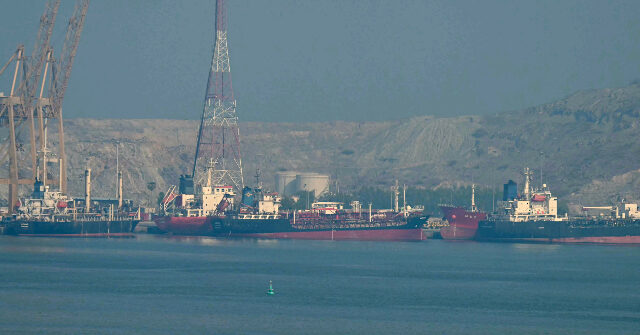Shipping rates on routes that could be affected by the Israel-Iran conflict skyrocketed by up to 76 percent in June.
It is too early at press time to predict how much they might come down in the wake of the ceasefire announced by President Donald Trump on Monday, especially because huge cargo ships and tankers make tempting targets for Iran and its terrorist proxies, even if Tehran keeps its promise to suspend military operations.
CNBC reported on Monday that the vital Port of Khor Fakkan in the United Arab Emirates (UAE) was especially nervous, because it lies on the Indian Ocean close to the Strait of Hormuz.
If Iran were to blockade the strait or launch terrorist attacks on ships passing through it, as the regime has repeatedly threatened to do, a huge amount of shipping between the Middle East, India, and Africa could be affected.
Shipping rates from Shanghai to Khor Fakkan consequently reached $3,341 per forty-foot equivalent unit (FEU) on Monday, about 76 percent higher than they were in May. The FEU, which represents the contents of a forty-foot-long shipping container, is a standard unit of measurement for the shipping industry.
“Shippers in the region have acted with caution as the level of risk has gradually increased. Shippers have been front-loading cargo in the most recent months, to bolster the supply chain from adverse disruptions to the flow of containerized goods,” Peter Sand, chief shipping analyst for freight analytics firm Xeneta, told CNBC.
Sand explained that the rush to front-load cargo shipments ahead of the Iran-Israel conflict meant huge cargo ships had to move more quickly, which means they burned more fuel, adding a surcharge to shipping fees.
Oil prices are actually down at the moment, defying predictions that prices would explode due to the conflict with Iran, but Sands cautioned that high shipping rates tend to be a “leading indicator of risk and uncertainty,” so the market remains nervous about what Iran might do next.
An oil tanker company called Frontline is currently refusing to accept contracts that would require its ships to pass through the Strait of Hormuz. If other shipping companies follow suit, the cost of moving oil around the world could increase.
Two of the biggest shipping firms, Maersk and Hapag Lloyd, decided to keep sailing through the Strait of Hormuz even after the Iranian parliament voted in favor of a blockade. This decision may have set a positive example for other companies that will keep shipping rates from rising much higher – assuming, of course, that Iran does not actually follow through with a blockade.
India’s Commerce Department said on Monday that shipping rates from India appeared to be holding steady, but “there is an apprehension that if the Strait of Hormuz is closed, there will be a major disruption in freight movement through the West Asian routes.”
If that happens, the Indian Commerce department warned that “rates may hit the roof.”
Analysts noted that up to 65 percent of India’s crude oil imports pass through the Strait of Hormuz, so a blockade or terrorist activity could cause energy prices to skyrocket and trigger an inflationary spiral in consumer prices. If the security situation in the Persian Gulf region were to further deteriorate, it could jeopardize India’s $8.6 billion in exports to Iraq, Jordan, Lebanon, and other Middle Eastern countries.
So far, the impact on both oil and cargo shipping has been far less severe than the doomsday scenarios floated when President Trump ordered U.S. airstrikes on Iran’s nuclear facilities. The key moment seems to have come when Iran chose a symbolic, stage-managed, and ineffectual “retaliatory strike” on Monday instead of escalating the conflict further. The Dow Jones Industrial Average, S&P 500, and Nasdaq all rose about half a percent when the news of Iran’s limited retaliation broke.
Read the full article here


